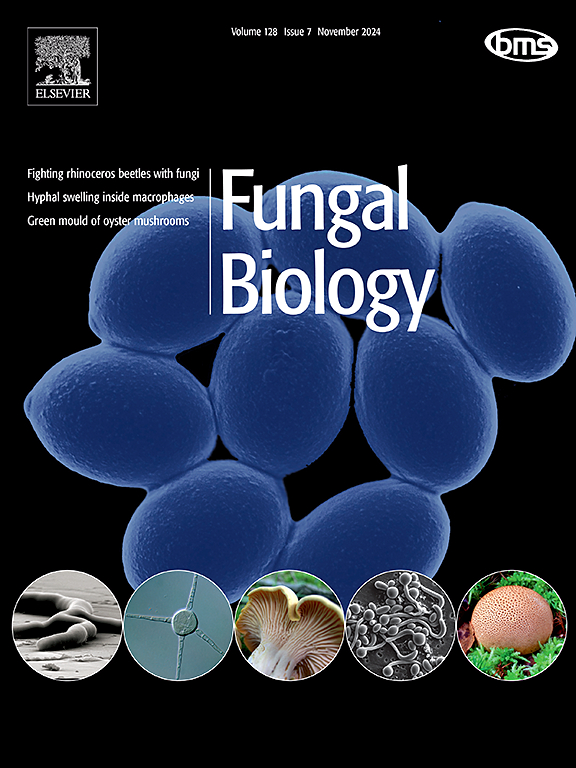醋酸胁迫下添加硫酸锌对酿酒酵母整体基因转录的影响及与细胞壁功能相关的锌和胁迫应答基因的鉴定
IF 2.9
3区 生物学
Q2 MYCOLOGY
引用次数: 0
摘要
硫酸锌是细胞代谢和应激保护的重要微量营养素。醋酸是木质纤维素水解物中常见的抑制剂,添加硫酸锌可以使酵母细胞更好地应对醋酸胁迫。深入了解硫酸锌如何导致全球基因转录的变化,有利于使用健壮的酵母菌株高效地生产纤维素乙醇。本研究采用醋酸胁迫下添加和不添加硫酸锌的出芽酵母酿酒酵母进行转录组学比较分析。分析显示,差异表达基因中细胞壁组织相关功能的富集。此外,我们证明了两个锌响应基因的缺失,包括与海藻糖生物合成相关的TPS2和分别参与蛋白质输出和几丁质生物合成的CHS5,在醋酸胁迫下会损害酵母的生长。同时,通过TPS2缺失观察到酿酒酵母细胞壁完整性减弱。此外,TPS2和CHS5的过表达对醋酸胁迫下酵母生长有积极影响。这些结果揭示了硫酸锌介导的代谢调节与细胞壁完整性之间的新联系,并为利用木质纤维素生物质可持续生产燃料乙醇和生物基化学品的健壮酵母菌株的开发提供了新的策略。本文章由计算机程序翻译,如有差异,请以英文原文为准。

Differential global gene transcription of Saccharomyces cerevisiae by zinc sulfate addition under acetic acid stress and identification of novel zinc and stress-responsive genes related to cell wall function
Zinc sulfate is an important micronutrient for cell metabolism and stress protection. Acetic acid is a common inhibitor present in lignocellulosic hydrolysate, and the addition of zinc sulfate allows yeast cells to better cope with acetic acid stress. In-depth understanding of how zinc sulfate leads to changes in global gene transcription benefits efficient cellulosic ethanol production using robust yeast strains. Here, comparative transcriptomic analyses were performed using budding yeast Saccharomyces cerevisiae grown with and without zinc sulfate supplementation under acetic acid stress. Analysis showed enrichment of functions related to cell wall organization in the differentially expressed genes. Furthermore, we proved that deletion of two zinc-responsive genes, including TPS2 related to trehalose biosynthesis and CHS5 involved in protein export and chitin biosynthesis, respectively, impaired yeast growth under acetic acid stress. Meanwhile, weakened cell wall integrity of S. cerevisiae was observed by TPS2 deletion. Furthermore, overexpression of TPS2 and CHS5 exerted a positive effect on yeast growth under acetic acid stress. These results reveal a novel connection between zinc sulfate-mediated metabolic regulation and cell wall integrity, as well as provide a novel strategy for the development of robust yeast strains for sustainable production of fuel ethanol and bio-based chemicals using lignocellulosic biomass.
求助全文
通过发布文献求助,成功后即可免费获取论文全文。
去求助
来源期刊

Fungal biology
MYCOLOGY-
CiteScore
5.80
自引率
4.00%
发文量
80
审稿时长
49 days
期刊介绍:
Fungal Biology publishes original contributions in all fields of basic and applied research involving fungi and fungus-like organisms (including oomycetes and slime moulds). Areas of investigation include biodeterioration, biotechnology, cell and developmental biology, ecology, evolution, genetics, geomycology, medical mycology, mutualistic interactions (including lichens and mycorrhizas), physiology, plant pathology, secondary metabolites, and taxonomy and systematics. Submissions on experimental methods are also welcomed. Priority is given to contributions likely to be of interest to a wide international audience.
 求助内容:
求助内容: 应助结果提醒方式:
应助结果提醒方式:


